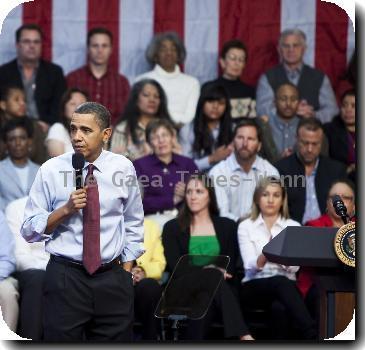PayPal millionaire’s rocket blasts off on 1st test flight, headed to space on tryout for NASA
By Marcia Dunn, APFriday, June 4, 2010
Millionaire’s rocket blasts off on 1st test flight
CAPE CANAVERAL, Fla. — A multimillionaire’s test rocket blasted off on its maiden voyage Friday and successfully reached orbit in a dry run for NASA’s push to go commercial.
SpaceX’s Falcon 9 rocket achieved Earth orbit nine minutes into the flight as planned, drawing praise from NASA, the White House and others eager for the company to start resupplying the International Space Station.
“All in all, this has been a good day for SpaceX and a promising development for the U.S. space program, as we make progress toward expanding the human presence in space,” launch commentator Robyn Ringuette announced from the company’s headquarters in Hawthorne, Calif.
SpaceX’s brand new rocket soared off its launch pad into thin clouds at mid-afternoon, carrying a mock-up of the company’s spacecraft, named Dragon. The goal was to put the capsule into a 155-mile-high orbit, which it did.
“Essentially a bull’s-eye,” a company spokeswoman said.
The first attempt to launch the 158-foot rocket was aborted in the final few seconds earlier in the afternoon.
NASA hopes to use the Falcon-Dragon combo for hauling cargo and possibly astronauts to the space station, once the shuttles retire later this year or early next. The first supply run could come next year.
SpaceX — or Space Exploration Technologies — was founded eight years ago by Elon Musk, a South African-born entrepreneur who co-founded PayPal. It is one of several companies vying for NASA’s business.
NASA Administrator Charles Bolden called Friday’s launch “an important milestone in the commercial transportation effort” and said it puts the company a step closer to supplying the space station.
And the White House Office of Science and Technology Policy shot out this tweet: “what a show!”
President Barack Obama toured the SpaceX launch site back in April in a strong show of support for commercial space and his effort to get NASA out of the orbit-ferrying business and into real outer space exploration, like expeditions to asteroids and Mars.
Musk was not immediately available for comment. More than an hour after liftoff, company spokeswoman Emily Shanklin still had not managed to reach him.
“I’m sure he’s in the launch control center very excited,” she said.
“We really want to open up space for humanity and make it accessible to a huge number of people,” Musk said Thursday. “That’s our long-term goal, sort of democratizing space. If we’re successful in the long term, space will become routine.”
Congratulations quickly poured in.
“Hats off,” the Planetary Society said in a statement. “Today’s flight of Falcon 9 could be the first small step toward relieving NASA launchers of the burden of low-Earth orbit, thus freeing the U.S. space agency to reach new worlds.”
Both Musk and the former space shuttle and space station commander in charge of astronaut safety and mission assurance for SpaceX, Kenneth Bowersox, repeatedly told reporters that they would learn from the test flight, no matter what the outcome and that it would help improve future Falcon flights.
The next Falcon 9 launch is targeted for sometime this summer from the same pad at Cape Canaveral Air Force Station, less than five miles from NASA’s shuttle launch pads at Kennedy Space Center. That rocket will hoist a true Dragon vessel on a test flight.
SpaceX has poured close to $400 million into its two lines of Falcon rockets. The Falcon 1 successfully flew in 2008 after three failed attempts, and again in 2009.
The Falcon takes its name from Han Solo’s zoomster in the “Star Wars” film saga, the Millennium Falcon. Musk chose the name Dragon because of how some viewed his unlikely venture, borrowing from Puff the Magic Dragon.
Online:
SpaceX: www.spacex.com/
Tags: Barack Obama, Cape Canaveral, Florida, North America, Science Policy, United States

